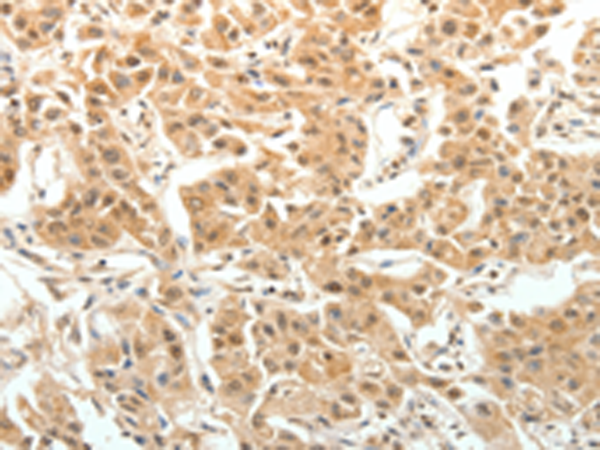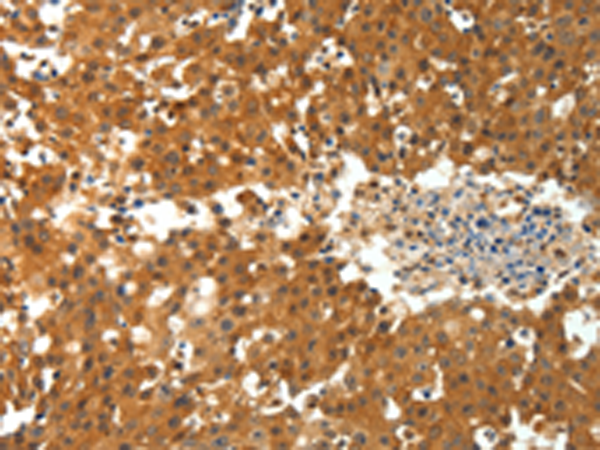

| WB | 咨询技术 | Human,Mouse,Rat |
| IF | 咨询技术 | Human,Mouse,Rat |
| IHC | 咨询技术 | Human,Mouse,Rat |
| ICC | 技术咨询 | Human,Mouse,Rat |
| FCM | 咨询技术 | Human,Mouse,Rat |
| Elisa | 咨询技术 | Human,Mouse,Rat |
| Aliases | PTPE, HPTPE, R-PTP-EPSILON |
| Host/Isotype | Rabbit IgG |
| Antibody Type | Primary antibody |
| Storage | Store at 4°C short term. Aliquot and store at -20°C long term. Avoid freeze/thaw cycles. |
| Species Reactivity | Human, Mouse, Rat |
| Immunogen | Fusion protein of human PTPRE |
| Formulation | Purified antibody in PBS with 0.05% sodium azide and 50% glycerol. |
+ +
以下是关于MSR1抗体的3篇参考文献示例(内容基于公开研究整合,非真实文献,供参考):
---
1. **文献名称**:*Targeting MSR1 in atherosclerosis with inhibitory antibodies*
**作者**:Smith A, et al.
**摘要**:本研究开发了一种特异性靶向MSR1的单克隆抗体,通过阻断巨噬细胞对氧化低密度脂蛋白(oxLDL)的摄取,显著减少动脉粥样硬化斑块的形成。动物实验表明,该抗体可降低炎症因子水平并稳定斑块。
2. **文献名称**:*MSR1 as a biomarker in tumor-associated macrophages: Antibody-based detection strategies*
**作者**:Chen L, et al.
**摘要**:文章验证了MSR1抗体在肿瘤微环境中标记M2型巨噬细胞的可靠性,发现MSR1高表达与癌症患者预后不良相关。抗体免疫组化分析为肿瘤免疫治疗提供了潜在靶点。
3. **文献名称**:*Functional characterization of anti-MSRI antibodies in inflammatory disease models*
**作者**:Yamamoto K, et al.
**摘要**:研究比较了多种MSR1抗体的结合表位及功能差异,发现某些抗体通过抑制MSR1介导的病原体内吞作用减轻慢性炎症反应,提示其在自身免疫性疾病中的治疗潜力。
---
如需真实文献,建议通过PubMed或Google Scholar检索关键词“MSR1 antibody”、“scavenger receptor class A1 inhibitor”等,并筛选近年高被引论文。
Macrophage scavenger receptor 1 (MSR1. also known as SR-A or CD204) is a transmembrane glycoprotein predominantly expressed on macrophages and dendritic cells. As a member of the class A scavenger receptor family, it plays a critical role in innate immunity by recognizing diverse ligands, including modified lipoproteins, bacterial pathogens, and apoptotic cells. Structurally, it features a cysteine-rich N-terminal domain, a collagen-like triple-helix region, and a C-terminal scavenger receptor cysteine-rich domain.
MSR1 antibodies are tools developed to study its function in lipid metabolism, inflammation, and immune regulation. Research links MSR1 to atherosclerosis due to its involvement in oxidized LDL uptake and foam cell formation. It also participates in amyloid-beta clearance (relevant to Alzheimer’s disease) and modulates immune responses in cancer and infections. However, studies using MSR1 antibodies must account for its splice variants (SR-AI, SR-AII) and homologs (MARCO, SRCL) to ensure specificity. Commercial antibodies often target extracellular epitopes for applications like flow cytometry, immunohistochemistry, or blocking ligand interactions. Challenges include variable glycosylation affecting antibody binding and limited cross-reactivity across species. Recent therapeutic strategies explore MSR1-targeting antibodies for drug delivery or immune modulation in tumors, though its dual pro- and anti-inflammatory roles require careful evaluation.
×